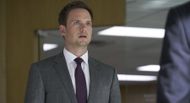Suits is a show that drew millions of fans with its sharp dialogue and dramatic office politics. For nine seasons, people watched Harvey Specter and Mike Ross take on big legal battles. The series gained even more attention after hitting streaming platforms. Its polished characters and high-stakes drama have kept viewers hooked for years. The story focuses on Harvey hiring Mike, who never went to law school. That premise alone is a stretch, but it’s just the beginning.
1. Mike Ross' Fraudulent Career

The central plot of Suits rests on Mike Ross practicing law without any legal credentials. This setup is highly unrealistic. In real life, law firms—especially prestigious ones like Pearson Hardman—conduct strict background checks. Mike’s lack of a law degree and bar certification would have been discovered immediately. The show suggests that his photographic memory and intelligence made him a valuable asset, but this doesn’t excuse the blatant fraud. Realistically, Harvey could have mentored Mike to attend law school and earn his degree. The premise, while absurd, adds tension and makes the story undeniably engaging.
2. Harvey's Risky Decision

Harvey hiring Mike, knowing full well he wasn’t a lawyer, is reckless and highly improbable. Senior partners at firms like Pearson Hardman protect their careers and reputations above all else. Trusting a stranger with such a massive secret defies logic. Harvey’s gamble drives much of the show’s drama, creating suspense as they work to hide Mike’s secret. However, the more realistic route would have been for Harvey to help Mike get into Harvard through a recommendation, preserving his integrity while still highlighting his mentorship. The choice makes the story iconic but stretches believability too far.
3. Harvard-Only Hiring Policy

Pearson Hardman’s strict “Harvard only” hiring policy feels elitist and unrealistic, even for a top-tier firm. Excluding graduates from other prestigious schools like Yale or Stanford undermines the firm’s ability to recruit top talent. While it highlights the firm’s obsession with prestige, it is a flawed and counterproductive rule in reality. Firms typically prioritize qualifications, experience, and fit over alma mater. This policy adds tension, especially when it ties into Mike’s secret, but it portrays an impractical hiring standard that would hinder any real-world firm’s success and reputation.
4. Lawyers as Generalists

Harvey and Mike handle every kind of case, from patent law to criminal defense, which isn’t realistic for high-level attorneys. In reality, lawyers specialize in specific areas such as corporate litigation, intellectual property, or criminal law. Generalizing dilutes expertise and would lead to malpractice in real life. This broad approach allows the show to explore a wide variety of storylines, keeping episodes fresh. However, it also sacrifices realism by making the characters seem overly competent in every legal field, something no real lawyer would manage in a firm of that size.
5. Unrealistically Glamorous Lawyer Lifestyles

Suits paints a picture of lawyers living luxurious lives with high-end suits, expensive cars, and endless cocktail hours. While lawyers at elite firms earn well, their actual work involves long hours, tedious research, and stressful deadlines. The show romanticizes the career, making it look more like a Hollywood fantasy than reality. This glamorous portrayal impacts the story by adding appeal for viewers but ignores the grind of legal work. It sacrifices accuracy to maintain a polished and stylish image, which has become a hallmark of the series.
6. Rapid Case Resolutions

Legal cases in Suits often get resolved in days, which is entirely unrealistic. In reality, litigation can take months or even years due to court schedules, detailed motions, and discovery phases. The show compresses these timelines to maintain its fast-paced storytelling, but it sacrifices accuracy. In real life, such speed would be impossible, especially in complex corporate cases. While this approach keeps viewers engaged, it misrepresents how legal work unfolds. A more realistic timeline would have added depth to the storytelling but likely slowed the show’s momentum.
7. Mike's LSAT Scam

Mike’s scheme of impersonating test-takers for the LSAT is absurdly unrealistic. Exam centers have strict ID verification, and repeat appearances would have raised immediate red flags. It’s hard to believe Mike managed this scam multiple times without getting caught. In reality, such actions would have resulted in lifetime bans from standardized testing and criminal charges. While it establishes Mike’s intelligence and resourcefulness early on, the premise stretches believability. A better setup might have showcased his talents in a way that didn’t require such a far-fetched backstory.
8. Unprofessional Office Dynamics

The constant backstabbing and emotional outbursts at Pearson Hardman would never fly in a real firm. Such behavior would destroy trust and morale, leading to high turnover and potential collapse. Senior partners undermining each other for personal gain might work for TV drama, but no real firm could sustain success with this level of dysfunction. The power struggles create engaging storylines, but they overdramatize workplace dynamics. A more subtle approach to office politics could have made the drama feel more grounded without losing its tension.
9. Donna Destroying Evidence

Donna’s decision to destroy evidence to protect Harvey is a major ethical breach that would have led to severe legal consequences. Tampering with evidence is illegal and could result in disbarment for everyone involved, not to mention jail time. While her loyalty adds emotional weight to the story, her actions are completely unjustifiable in a legal context. A more realistic route would have been for Donna to consult Harvey to handle the situation legally. This moment highlights Donna’s love for Harvey but undermines the show’s credibility regarding legal ethics.
10. Mike's Criminal Record

After serving time for fraud, Mike’s return to legal work is far-fetched. In real life, a criminal record would prevent him from working in any legal capacity, even at a nonprofit clinic. His involvement would jeopardize the reputation of any firm willing to hire him. The show treats his redemption arc as an emotional victory, but it disregards the practical consequences of his conviction. A more realistic depiction would have focused on Mike rebuilding his life in a different field while grappling with the fallout of his actions.
11. Weak Password Choices

Mike Ross using “Ross99” as his computer password feels inconsistent with his intelligence and attention to detail. Someone with his brilliance and ability to memorize complex information could easily come up with a strong, unique password. In real life, weak passwords like this would pose a serious security risk, especially in a high-stakes legal environment. The decision to include this detail seems like an unnecessary way to highlight his naivety. A better choice would have been a more clever or secure password that aligned with his established character traits.
12. Judges' Tolerance of Outbursts

The courtroom antics in Suits often go unchecked, with lawyers making sarcastic remarks and interrupting proceedings without facing consequences. Real judges enforce strict decorum, and such behavior would lead to contempt charges or fines. This lack of realism undermines the integrity of the legal setting. While these dramatic moments add tension and personality to the scenes, they stray far from actual courtroom behavior. A more accurate portrayal of courtroom dynamics would have retained the drama without sacrificing believability or respect for legal procedures.
13. Jessica's Unrealistic Career Timeline

Jessica Pearson becoming a name partner in her early 40s is highly improbable in real life. Achieving that level of seniority typically requires decades of work, making it more common for name partners to be in their 50s or 60s. While her career progression highlights her brilliance and ambition, it oversimplifies the challenges women, especially women of color, face in male-dominated fields. Her fast rise adds dramatic weight to her character but sacrifices realism. A slightly older Jessica would have made her success feel more authentic.
14. Back-to-Back Firm Name Changes

The frequent name changes of the firm—Pearson Hardman, Pearson Specter, Pearson Specter Litt—are highly impractical for branding and client trust. Rebranding a law firm involves massive costs and risks, particularly when it occurs due to internal conflicts. Constantly changing the name would confuse clients and damage the firm’s reputation. While the changes symbolize power shifts and internal politics, they ignore the reality of how firms build long-term client relationships. A subtler way of showcasing these dynamics could have maintained consistency without unnecessary upheaval.
15. Rachel’s Sudden Rise to Associate

Rachel Zane’s rapid transition from paralegal to associate feels rushed and unrealistic. In reality, this would require years of law school, passing the bar exam, and building experience. The storyline skips over these critical steps, portraying her promotion as more of a narrative convenience than a reflection of real legal career progression. While it’s satisfying to see her achieve her dreams, a more gradual approach would have added depth to her character arc and made her success feel earned, rather than handed to her for dramatic purposes.
16. Excessive Betrayals

The constant betrayals and power struggles at Pearson Hardman would destroy any real firm. Partners undermining one another, blackmailing colleagues, and forming secret alliances create a toxic work environment that would lead to mass resignations and a collapse in client trust. While it drives drama, it paints an unrealistic picture of firm operations. A healthier balance between internal politics and professional collaboration could have added complexity without making the firm seem like a battlefield. The relentless conflict makes the show entertaining but strains believability.
17. Mike's Lack of Academic Pursuit

Mike’s refusal to earn a legitimate law degree, despite ample opportunities, feels frustrating and unrealistic. Harvey could have easily mentored him through law school or secured him a spot at Harvard. Instead, the show stretches his fraudulent career for dramatic tension, ignoring how implausible it becomes over time. A storyline where Mike works to earn his credentials while navigating ethical dilemmas would have been more satisfying. The decision to skip this arc diminishes his character’s growth and undermines the show’s attempt to portray his brilliance.
18. The Associates’ Old-School Research

Suits frequently shows associates poring over physical legal tomes, which feels outdated for a firm of Pearson Hardman’s stature. By the show’s timeline, most firms had transitioned to digital research using platforms like LexisNexis or Westlaw. While books provide a visual shorthand for grueling research, it undermines the show’s claim of being set in a cutting-edge firm. Depicting more realistic digital workflows would have added authenticity while keeping the same dramatic weight. The insistence on old-school methods feels anachronistic and unnecessary.
19. Keith Hoyt’s Poker Contract

The storyline where Keith Hoyt gambles away his company while intoxicated ignores basic contract law. Contracts signed under intoxication are voidable, making this plot point legally unsound. Suits leans on the drama of the situation but ignores that any competent lawyer could have easily nullified the agreement. While the poker game adds tension and showcases Harvey’s strategy, it sacrifices realism for storytelling. A more plausible conflict, such as a high-stakes negotiation, could have achieved the same impact without stretching legal principles.
20. Fails the Bechdel Test

Despite featuring strong female characters like Jessica Pearson and Donna Paulsen, Suits often fails the Bechdel test. Most conversations involving women revolve around male characters or romantic subplots, sidelining their individual growth. This oversight diminishes the depth of its female cast, especially in a show with professional women in prominent roles. Later seasons make efforts to address this, but the issue persists throughout much of the series. Highlighting their professional achievements without tying them to male counterparts would have added balance and complexity.
